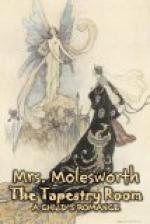“Well, the few remaining days passed, and one cold, dreary morning poor Charlotte clambered over the railings for the last time, to embrace her friends and bid them farewell. She might have come in by the door and seen them in the salon; of course neither her aunt nor our young ladies’ mother would have objected to such a thing, as she was going away, even though no visits of ceremony had been exchanged between the families. But this would not have suited Charlotte; it was in the garden she had first seen her friends, and in the garden must she bid them good-bye. I assisted at the interview,” continued Dudu, “and very touching it was. Had I been of a nature to shed tears, I really think my feelings would have been too much for me. And Charlotte would have kissed and hugged me too, no doubt, had I encouraged anything of the kind. But, fortunately perhaps for the preservation of my feathers and my dignity, I am not, and never have been, of a demonstrative disposition.”
Dudu cleared his throat and stopped to rest for a moment. Then he continued—
“The parting was over at last, and little Charlotte was away—quite away over the sea in cold, rainy England. Cold and rainy it must have been that winter in any case, for it was cold and rainy even here, and many changes happened, and shadows of strange events were already faintly darkening the future. It was the next year that our pretty Mademoiselle Jeanne married and went away with her husband from the old house, which yet was to be her home, and the home of her children in the end, for Mademoiselle Eliane never married, and so all came to be inherited by her sister’s sons. But with that we have nothing to do at present. I wished only to tell you what concerns our young ladies’ friendship with the little stranger. Years went on, as they always do, whether they leave the world happy or miserable, and the shadows I have told you of grew darker and darker. Then, at last, the terrible days began—the storm burst forth, our happy, peaceful home, with hundreds and thousands of others, was broken up, and its kindly inhabitants forced to flee. Mademoiselle Jeanne came hurrying up from her husband’s home, where things were even worse than with us, with her boys, to seek for shelter and safety, which, alas! could not be given her here. For all had to flee—my poor old master, frail as he was, his delicate wife, our young ladies, and the boys—all fled together, and after facing perils such as I trust none of their descendants will ever know, they reached a safe refuge. And then they had to endure a new misery, for months and months went by before they had any tidings of poor Mademoiselle Jeanne’s husband, your great-grandfather, my children, who, like all of his name—a name you may well be proud of, my little Mademoiselle Jeanne—stayed at the post of danger till every hope was passed. Then at last, in disguise, he managed to escape, and reached this place in safety, hoping here to find




